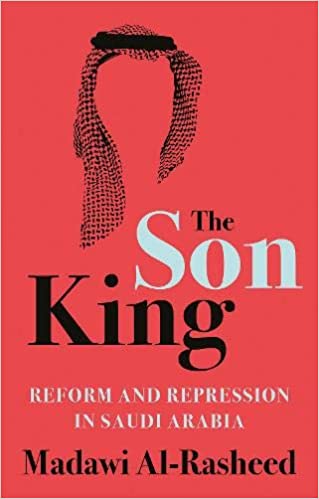
Social anthropologist Madawi Al-Rasheed’s new book The Son King: Reform and Repression in Saudi Arabia looks at the conflicts taking place in the desert Kingdom both historically and under the de facto rule of Crown Prince Mohammad Bin Salman, the eponymous Son King. The author examines the central issue of Saudi politics, which is how to reform the regime’s image while continuing to repress its own citizens.
On a social level, Al-Rasheed argues, the Kingdom’s millennials have undergone a revolution and are open to the world, critically minded and questioning of tradition. Under Bin Salman, attempts to placate them while fostering a sense of loyalty to the House of Saud are key to his vision for the country’s future.
Al-Rasheed deals with the issue of nationalism and points to changing trends, namely the move from an exclusively religious nationalism to a hybrid religio-secular version. “The first state-building project was conducted under a religious umbrella rather than a national agenda,” she writes. “Unlike many post-colonial states in which national liberation struggles determined the character of the new nation and underpinned nation-building projects, Saudi Arabia came together as a result of a religious narrative that focused on salvation…”
She goes on to point out that, “Much has been written about the centrality of the Wahhabi tradition in the creation of the state, but less about how the tradition was transformed into a national religious project whose objective was to homogenise the fragments that gradually became part of the state.”
According to Al-Rasheed, “The religious intelligentsia and their followers did not imagine themselves as part of a ‘Saudi nation, but rather of an Islamic nation.” Her book demonstrates that the early state-building project did not create a sense of Saudi national consciousness and that dissent against the House of Saud was initially treated as a type of blasphemy, rather than treason. However, under Bin Salman these trends have started to shift and a new nationalist project is emerging, which decentralises Wahhabism and aims to find new sources of legitimacy.
The Humanity of Muhammad: A Christian View
“The newly celebrated citizen is no longer the one who obeys the religious clerics… but the electric and creative young entrepreneur and propagandist for the regime. National glory now resides in reinvented geographies, other than, or perhaps in addition to, the historical Islamic Mecca and Medina. The ancient archaeological sites that had been ignored and neglected as they were considered icons of blasphemy in a pre-Islamic era, such as Madain Salih and Al-Ula, are now sources of national pride.”
While the new nationalism represents an attempt by the state to foster loyalty among the citizenry, there is considerable civil resistance which challenges the image of liberal reforms being projected by the regime. The level of repression has reached new heights in the Kingdom and contributed to a large community of Saudi exiles.
“The crown prince has commissioned a study to assess this troubling new phenomenon,” explains the author. “An internal government report, which is not publicly available, predicted that by 2030 the number of Saudi exiles would rise to 50,000.”
Read: Saudi Arabia’s economy shrinks for fifth consecutive quarter
The growth of exile networks is something that Al-Rasheed also explores. Unlike previous exiles, the new diaspora is ideologically diverse and includes liberals, secularists, Islamists, feminists and nationalists who, despite their differences, have managed to forge bonds abroad and collaborate in activist circles. Such groupings would have been unthinkable within Saudi Arabia, and this leaves open the question of whether a new Saudi national identity will be constructed overseas in opposition to the House of Saud.
Against the Loveless World
The topics covered in this book include the “runaway girls” phenomenon and the growth of online entertainment. As the author makes clear, Saudi Arabia was a society already reforming itself prior to Bin Salman having effective control of the Kingdom, and youth-led projects and initiatives have changed the way that Saudi citizens view themselves. While cautioning against the oversimplification of what is happening in the Kingdom, it is obvious that some of the prince’s reforms appeal to the younger generation, even though the nature of his rule threatens to strangle civil society activism, which will hurt the country in the long run.
While Al-Rasheed’s book gets us to contemplate this possible crisis, it is not written for a specialist audience; anyone interested in what is happening in Saudi Arabia will find it a good read. She provides a lot of excellent background material on a lot of issues, but does not overwhelm the reader with extensive detail and writes in an accessible way. The Son King… joins the growing body of work that unmasks the reality of repression in the Kingdom and challenges the simplistic notion of Saudi Arabians as religious extremists who need a royal strongman to keep them in check.